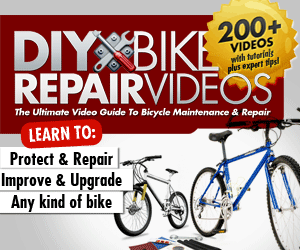Maintain the Chain a Necessary Bike Skill
The chain is the crucial element of a bicycle – if it breaks, you aren’t going anywhere. So proper maintenance is essential.
Of all the components on your bike, the chain is the most important. No chain….no go!
Proper chain maintenance will extend the life of your chain – although any chain should be replaced after you’ve put 1000 miles on it. Don’t use a chain any longer that necessary – if its rusted or stretched, it’s time to get a new chain.
A bike chain is put together from hundreds of precision-machined parts, consisting of pins, plates and rollers. If it gets full of gunk it will negatively impact your biking experience, and not do your cogs much good either.
The easiest way to take care of the chain is simply to keep it lubricated. Of course – too much of anything is a bad thing. You want the chain lubricated, but the lubrication itself does attract grit, so you don’t want to use too much of it.
If you’ve ridden your bike through a trail full of mud, you’ll want to clean it as soon as you return home.
Cleaning a chain
It’s a hassle to take the chain off your bike, but you can certainly do it if you want to. However, in most cases it works just to clean it while its still on the bike. Simply spray degreaser (which you can get at your local bikeshop) onto the chain, the derailleur, the cogs and th echain ring. Let the degreaser do its thing for about 20 minutes – then use a rag or stiff-bristle brush to clean off the gunk. Then, simply hose it down. Then, dry it. Then, lube the chain.
Lubrication
Wipe and lubricate your chain before every ride – it’s that simple. Lubrications are made from various ingredients – there are wax-based lubes and there are wet lubes. It’s a good idea to keep a notebook in which you record which lube you use and how long your chain lasts. In this way you’ll find out which lube works best for your bike and your type of riding.
Chain Suck
Ever experienced this? This happens when the chain doesn’t release from the bottom of the chainring and pulls up instead – rather than running straight to the lower rear derailleur. Don’t blame this on the front derailleur – it’s caused by a worn chain.
Chain wear indicator
The rule of thumb is to replace a chain after you’ve put a thousand miles on it, but if you don’t have an odometer on your bike and don’t keep track of how many miles you ride, what can you do? Simple. Purchase a chain wear indicator, and use it on a week-to-week basis. You want to replace the chain as soon as it “goes out of spec” because if you don’t, it will wear down the cogs on the drive train and you’ll have to replace that as well, as the new chain you eventually do get probably won’t fit.



